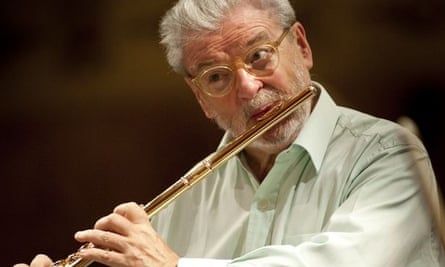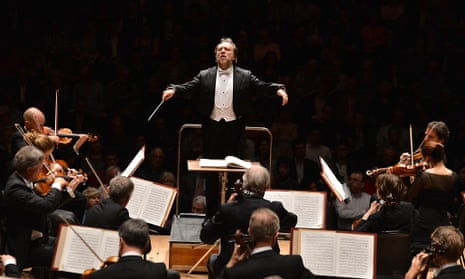Tonight’s Gramophone classical music awards have handed out their top prize to Riccardo Chailly and the Gewandhausorchester Leipzig for their Brahms Symphony Cycle, released on Decca.
Chailly and his orchestra were in London last autumn to perform the cycle at the Barbican, where the conductor’s fresh approach to Brahms was hailed by the Guardian’s Andrew Clements as “both mindful of the performing traditions and critical of them in the best, most constructive way”.
Gramophone magazine’s editor-in-chief James Jolly said the recording, which also won in the orchestral category, “epitomises classical music’s way of reinventing itself and staying relevant to every generation.”
Violinist Leonidas Kavakos, whose recording of Brahms’s Violin Concerto – also with Chailly and the Gewandhaus – earned a five-star review in this paper, was voted artist of the year by an international public vote. The Greek musician won his first – and last – Gramophone award 23 years ago, at the very beginning of his solo career. The award, said Jolly, honours a musician in his prime.

Two of classical music’s greatest and best-known performers from earlier generations were also honoured in the evening’s ceremony. Conductor Neville Marriner was presented with an outstanding achievement award in his 90th year, and Northern Irish flautist James Galway, now 74, was honoured with the lifetime achievement award. Galway’s recordings have sold over 30m copies worldwide; Annie’s Song reached No 3 in the UK pop charts in 1978, and made him a crossover star. If his public profile is lower-key these days, he continues to perform around the world and campaign for music education. “He put the flute on the musical map in modern times … He is a true classical music superstar … his role in music education is powerful and heartfelt,” said Jolly, paying tribute to the Belfast-born musician.
A popular winner in the baroque instrumental category was British-based harpsichordist Mahan Esfahani, for his anniversary tribute to CPE Bach. His recording of JS Bach’s second son’s Württemberg Sonatas “wonderfully convey the sense of the younger Bach flexing his muscles in the new musical language that he was involved in creating,” wrote Andrew Clements. CPE Bach made a second appearance in the baroque vocal category, where Hans-Christoph Rademann’s recording of his Magnificat won top prize. The judges hailed the “fresh, athletic choral singing, playing of crackling, fizzing energy and excellent choral work”.
The contemporary award went to George Benjamin’s acclaimed opera Written on Skin – its second major gong this year following the RPS award for large-scale composition. Other awards went to British countertenor Iestyn Davies for Arise My muse on the Wigmore Live label, and John Butt and the Dunedin Consort for their radical reconstruction of the first performance of Mozart’s Requiem.
Full details of the winners at Gramophone.co.uk

Comments (…)
Sign in or create your Guardian account to join the discussion